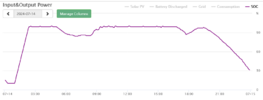Interesting, I have solar panels on the house, and an inverter which connects them to a 3.2 kWh battery, I have not tried turning power off as an experiment, but when a HV fault in the street gave us a 5-hour plus power cut they worked well.
What I don't know, is what will happen once the battery goes flat? Will the inverter restart once the sun comes up, the battery will normally discharge to 10%, and with no grid to 4% the question is would the 4% keep the inverter live, so it can fire up again when the sun comes up. Think it will likely last the night.
But the output is so weather dependent. Today for example.

does not matter how much, it is how it has varied, so in summer the battery is charged overnight, then at 5 am it stops charging, and we get a dip before the sun moved around as panels are South West facing, then it starts to discharge as the evening starts.

with luck, lasts until the off-peak charging starts. But in winter we did not have the smart meter, so there was no off-peak charging, so back in January

there were very few days when the battery could have been fully charged, about 2/3 of the days did we get 3.2 kWh in the day, but last month some days we got 10 times the batteries' capacity.

the only way the solar really works in the winter, is that the inverter and battery allow us to use off-peak to recharge the battery. One poor day, it may continue to work, but we tend to get a run of poor days.
I tried to use a solar charger in my caravan when in storage, it failed, in part due to the radio, if disconnected it went into demo mode, so would not allow the battery to recharge.
But I have an interaction problem, when some outside lights are inhibited due to others working. Maybe better to show the year.

Green is solar production, and you can see how little we got in the winter months. Do not scale change 0–600 and then 0–1000. I know your panels are much smaller, but I have a display for mine, so easy to see how much it changes through the year.







